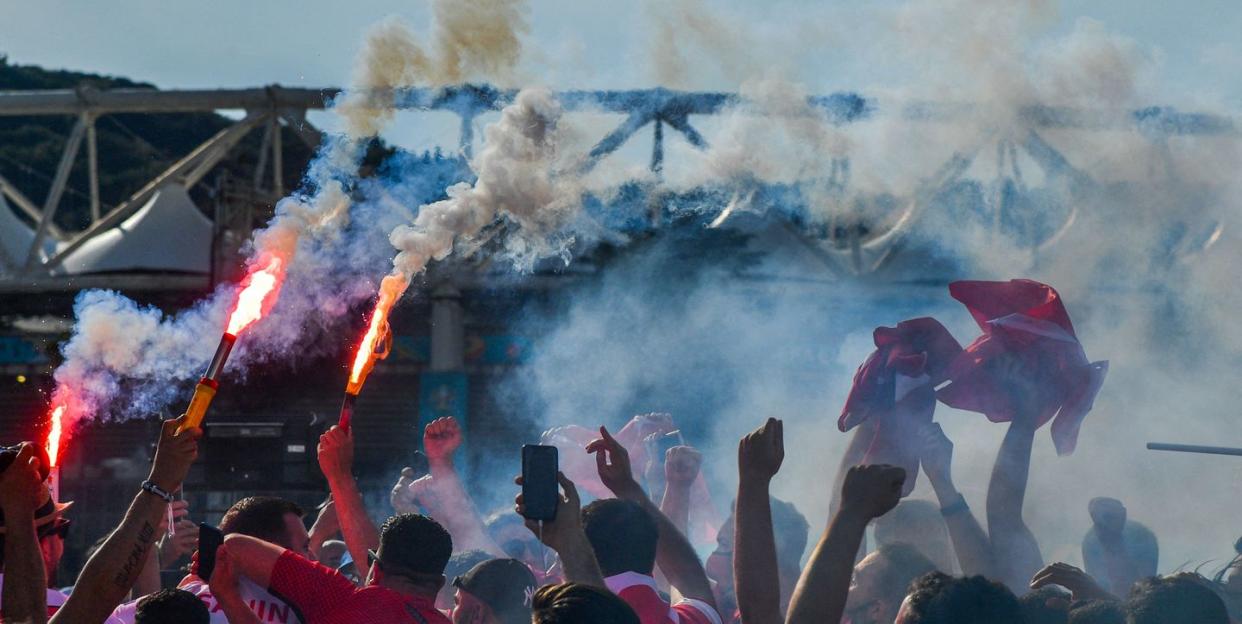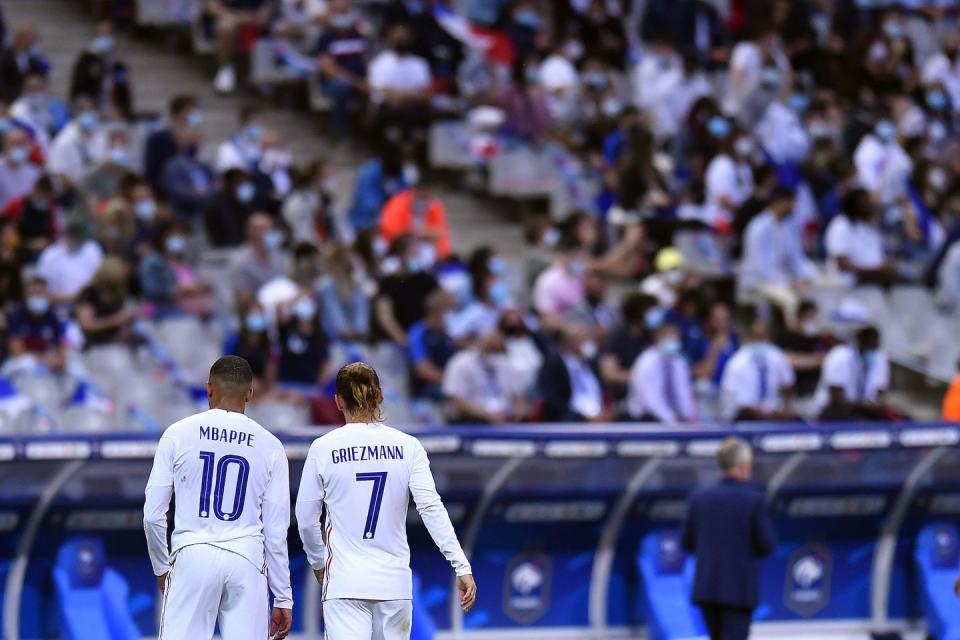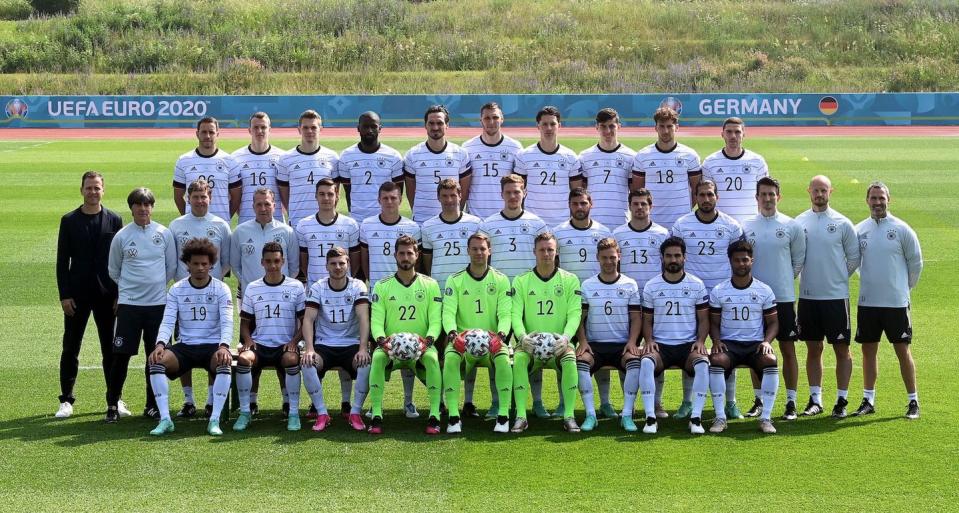A Completely Objective Lightning Guide to the Euro 2020 Tournament

As another gift delivered by COVID-19, Euro 2020 is set to kick off today—Friday, June 11, 2021—after a year's delay. While non-fanatic laypersons may be more familiar with the World Cup, there's a strong argument to be made that the European Championships—which usually are held on the two-year intervals between World Cups, not unlike the Summer and Winter Olympics—is actually a higher-level soccer competition. There are simply fewer weak teams present, with the notable exception this year of North Macedonia. (Sorry, guys. Best of luck.) With the tournament's opening match between Italy and Turkey coming up fast—3 p.m. Eastern on ESPN, while some games will be on ABC—here's a lightning guide to the festivities over the next month.
The Format
The 24 teams who survived qualifying have been sorted into six groups of four for the Group Stage. This year, the matches will be played all around Europe rather than in one host country, with games in London, St. Petersburg, Munich, Rome, Amsterdam, Bucharest, Budapest, Copenhagen, Glasgow, Seville, and Baku. The teams in each group, A through F, will each play each other once. Three points for a win, one each for a draw. The top two teams from each group qualify for the Knockout Stage, where they're matched against a team from another group for a one-off single-elimination game, creating a bracket tournament beginning with the Round of 16. Then there's quarterfinals, semis, and the final at London's Wembley Stadium on July 11.
The Favorites
France look absolutely formidable, even if the 2018 World Cup champions have been drawn in this year's Group of Death with Portugal, Germany, and the very unfortunate Hungary. The French lineup is just stupid good, having added Real Madrid's Karim Benzema after he missed out on the World Cup squad thanks to some off-field shenanigans. Whichever of those other two big dogs make it out—Portugal or Germany—will also be a decent shout. Portugal were European champions in 2016, and this may be Cristiano Ronaldo's last European Championships. (As a LeBron-style physical specimen who compulsively keeps himself in top shape, he will probably show up in Qatar for World Cup 2022 at the age of 38.) Germany are coming off a disastrous 2018 World Cup, but they usually have a knack of sticking around until at least the semifinal stage at these big tournaments. And they still have Toni Kroos, Ilkay Gundogan, Leroy Sane, Joshua Kimmich, and the relentlessly effective Thomas Muller. The prospect of Germany on the warpath, seeking redemption, is historically something to keep an eye on.

Outside of the deathly Group F, England are second in the betting odds—probably thanks to English folks, who love a punt, betting with the heart—but will probably face a tougher test in Group D than it appears on paper. Croatia were World Cup finalists last time around, losing out to the French, and Scotland will be eager to stick it to the old enemy. England do have some degree of home-field advantage, however, as they'll play a bunch of matches in London. Spain are the least favored they've been in some time, at 8-1, but have what looks like a relatively easy group to get out of. The two Benelux countries in attendance, Belgium and the Netherlands, are worth looking at for different reasons. Belgium are among the most formidable squads in the tournament, full stop, though they've got some injury issues. The Dutch are without their talismanic defender, Virgil Van Dijk, which has left them at 14-1 to win the tournament, but the squad is still full of great players. Italy, which has a knack for success at big tournaments that sits just below Germany's, is always worth watching, even if this is not their strongest squad in living memory and their group, featuring Turkey, Wales, and Switzerland, will be difficult.
The Players to Watch
It will be a lot of fun to see what Cristiano Ronaldo does at age 36. He has transformed his game from the young fleet-footed winger of his youth to the world's premier penalty-box threat. He may well be the best pure goalscorer of all time. His teammate, Manchester City's Ruben Dias, is a powerhouse central defender who will be key to Portugal's chances of climbing out of the group alongside Bruno Fernandes in midfield. Belgium's Kevin De Bruyne is probably the best attacking midfielder at the tournament—and anywhere else, for that matter—and if he's fully fit, he'll be a fountain of goals and assists. He is a strong runner with the ball, too, and a highly skilled technician, but he is the very essence of a soccer genius. He sees things that virtually no one else can. He can feel the game intuitively. He'll be feeding Romelu Lukaku up front, who's coming off a scintillating season for Inter Milan. Eden Hazard will be less happy with his campaign, but may see this as a chance for redemption.

Wales have their two stars, Gareth Bale and Aaron Ramsey, who will be looking to prove a point after somewhat indifferent seasons for their clubs. They will likely have to carry that squad. Their bigger neighbors, England, have a whole host of young attacking talent, including Jadon Sancho, Jack Grealish, Phil Foden, Marcus Rashford, Jude Bellingham, and Bukayo Saka. They'll fit in behind Harry Kane, England's captain and talismanic striker, and hopefully make up for the squad's shortcomings in defense and central midfield. Poland's Robert Lewandowski is also among the world's greatest strikers, and will carry a heavy burden for a side that stands a decent chance of getting out of Group E. For the Netherlands, young Barcelona maestro Frenkie De Jong will put on a midfield show alongside Giorginjo Wijaldum, and Memphis Depay up front is enjoying a renaissance. For Germany, look for Ilkay Gundogan in midfield. He's a fantastic passer, but he'll also make late runs into the box and score goals.
And then there's France. The spine of the team, from goalkeeper Hugo Lloris, to centerbacks Raphael Varane and Presnel Kimpembe, to Ngolo Kante and Paul Pogba in midfield, and Kylian Mbappe and Karim Benzema up front, is frankly insane. There are more incredible players, like Barcelona's Antoine Griezmann, all over the squad. On paper, there is no reason why this team—finalists in 2016, World Cup champions in 2018—should not be hoisting the trophy again.
Who to Root For
You might go with the heavy favorites above, but allow me to suggest some others. Scotland will be a lot of fun, especially in that ancient rivalry matchup with England. A Wales run similar to their semifinal appearance in 2016 would also be a treat. Italy has brought a young, exciting squad that contrasts somewhat with their occasional preference for grizzled veterans who will grind out results. Croatia's Luka Modric may well be playing his last major tournament after hauling his nation to the World Cup Final in 2018—and earning himself the World Player of the Year award in the process. He is another midfield genius, a conductor of the orchestra. Ukraine could use something to cheer, God knows. Supporting the stylish technique arriving from sunny Spain will for once not mark you as a bandwagoner, and the young and dynamic Netherlands squad is also more of a darkhorse than usual. Don't root for Germany, though, they don't need your help. And spare a prayer for North Macedonia.
You Might Also Like


